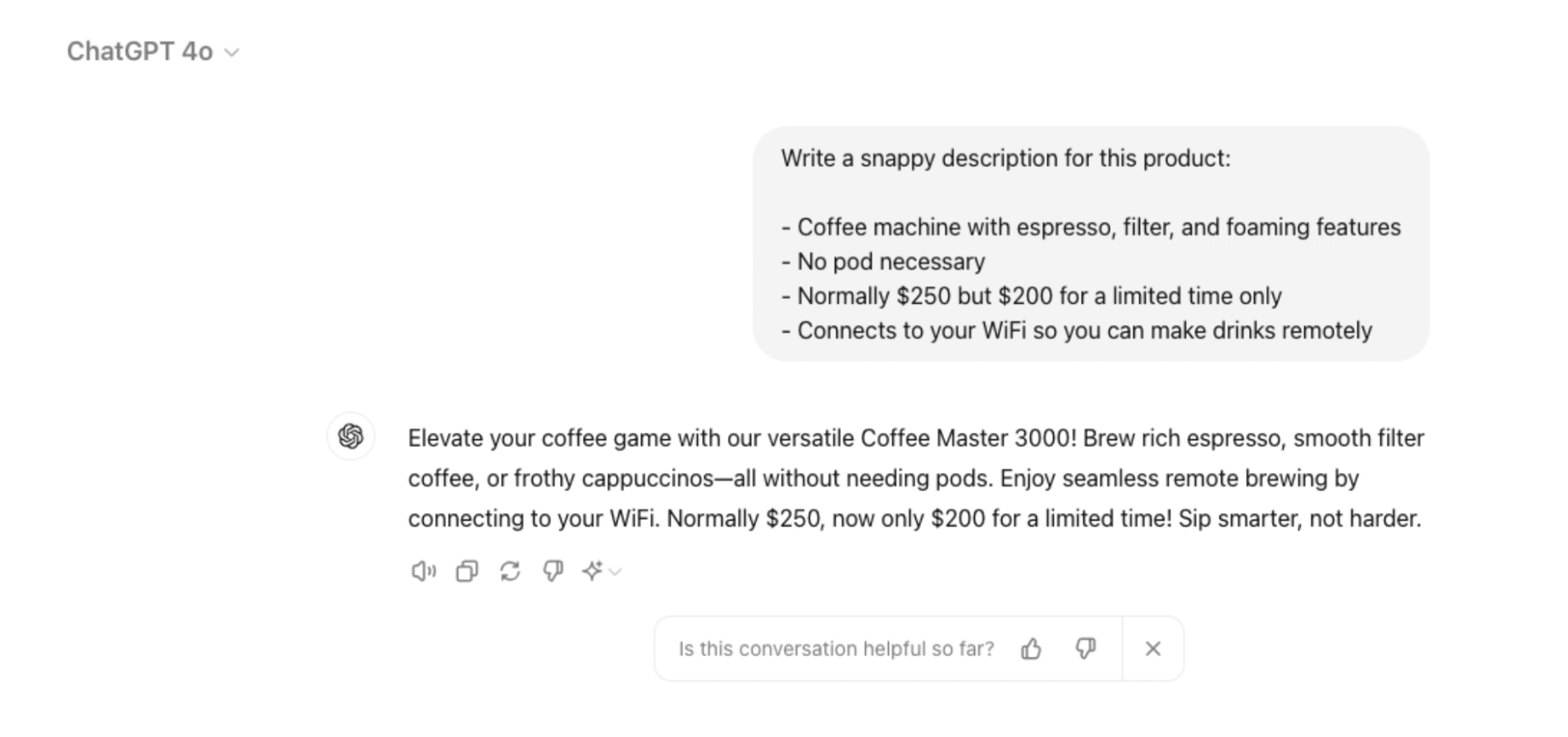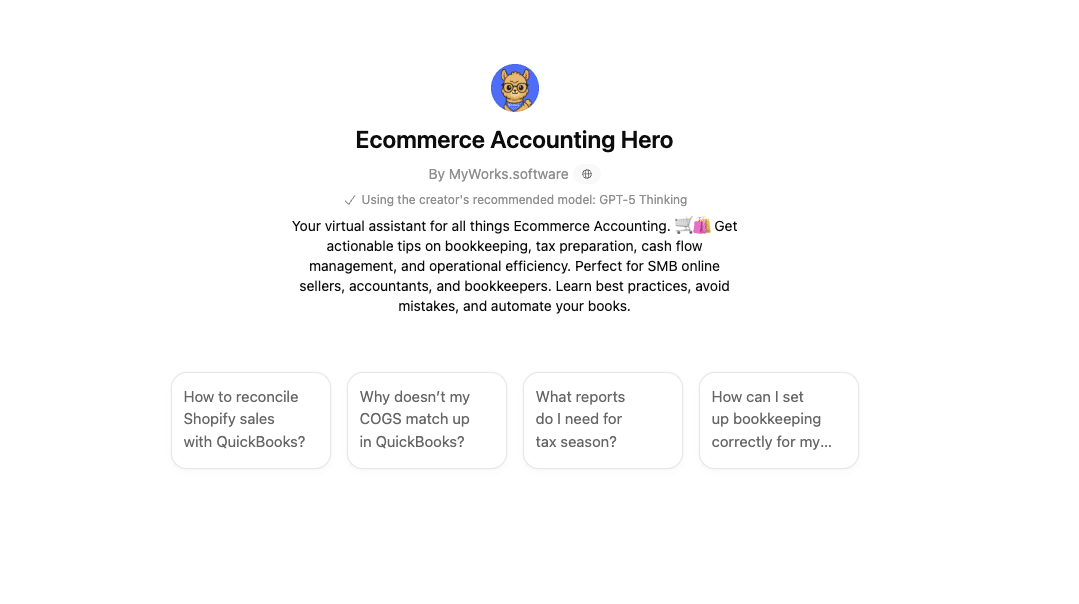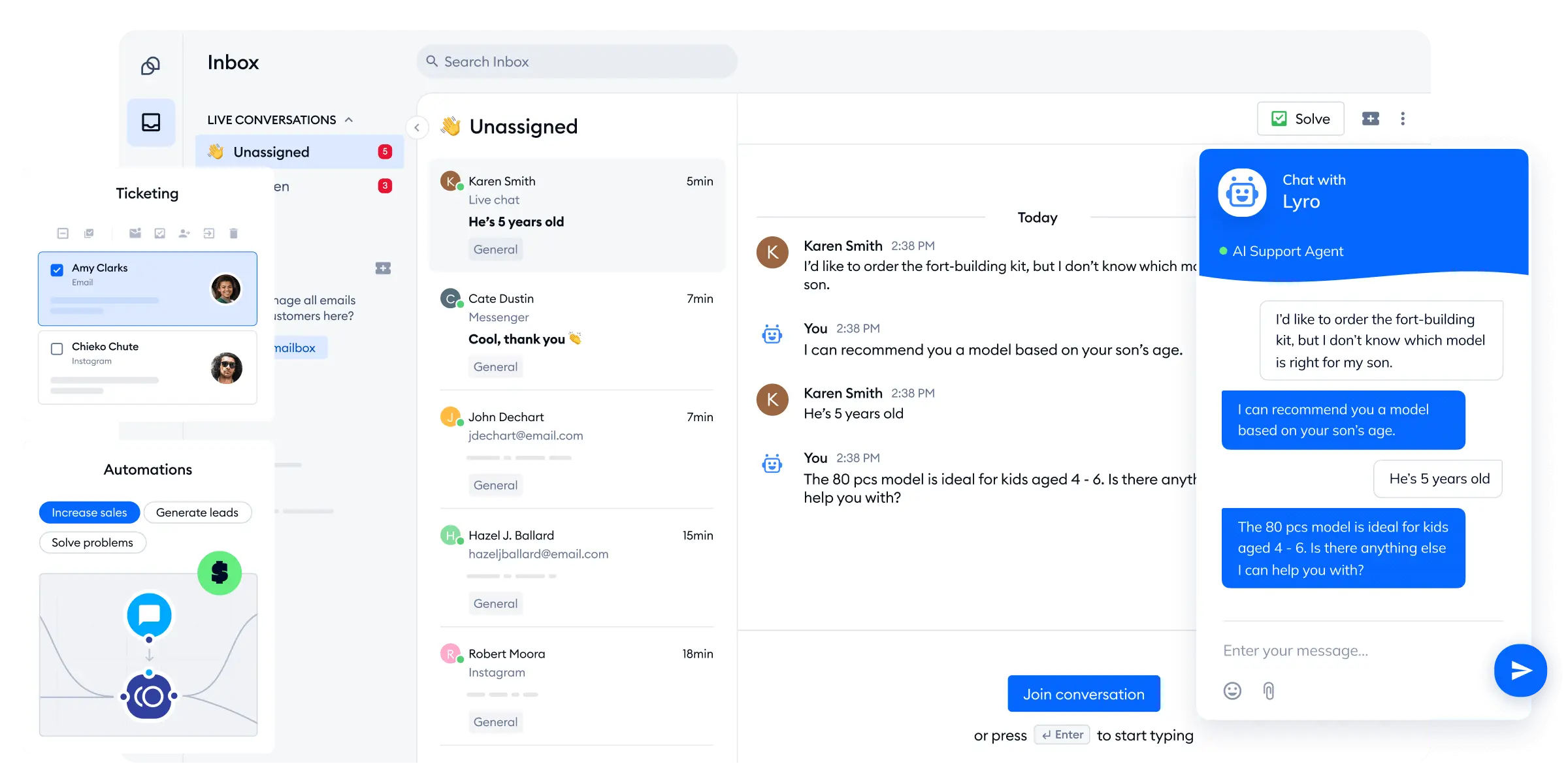AI tools can have a transformative effect on your ecommerce business. You can use them to scale your operations, drive sustainable growth, and compete with top brands.
As AI has become more common, a variety of tools have hit the market. However, the technology is still in development. Many of the most popular apps out there are already out of date and lack essential features. What’s more, the quality can vary drastically between new and unproven apps.
So, how are you supposed to find the right AI tools for your ecommerce business?
Our guide looks at some of the best apps on the market for online stores. We’ve picked them not only based on their capabilities but also their ease of use and integrations.
Can you just use free generative AI tools for e-commerce?
Many people rely on platforms like ChatGPT to handle basic tasks. Here are some of the ways you can use these free AI tools for ecommerce:
- Writing item descriptions: AI can quickly generate concise and accurate product descriptions based on simple prompts.
- Brainstorming product ideas: You can ask AI to suggest new items you could sell or variations on old ones.
- Generating blog posts: If you need to get content on your site in a hurry, ChatGPT can create basic articles.
- Translation: AI can help you produce different language versions of your site.
- Pictures: You can use some AI image tools for your ecommerce site’s photos and graphics. However, beware of the strange results these tools sometimes produce.

Tools like ChatGPT can help you with a range of operations but they can be limited. Recently, we’ve seen more specially designed AI solutions for ecommerce that are less comprehensive but more reliable.
Let’s look at some of the best AI tools for ecommerce and how they can benefit your business.
Best AI tools for ecommerce website design
Even if you use a website builder, customizing an ecommerce site can be daunting. It takes time and effort to make your store look professional. You can hire a graphic designer to do it for you but not everyone has the budget.
Now there are many AI tools that can perform this task for you at a fraction of the time and cost. Canva’s Magic Design is a standout option for all store owners. All you have to do is type in a prompt and the AI handles the building process.
You can create:
- Logos and graphics
- Website banners
- Email templates and newsletters
- Social media ads

You can even create full landing and product pages for your website. Be warned that Canva doesn’t sync directly with popular platforms like Shopify and WooCommerce so you may need to install a plug-in.
Another popular tool is the AI website builder, Appy Pie. All you have to do is make a couple of quick decisions about how you want your website to look. The AI then creates your design in seconds. If you want more control, you can also use it to customize pre-made templates.
Appy Pie connects with both Shopify and Woocommerce so you can design your site within the store dashboard.
Best AI Tool for Ecommerce Accounting
When it comes to managing your store’s finances, Ecommerce Accounting Hero stands out as the go-to AI tool built specifically to help with ecommerce bookkeeping. Unlike general AI assistants, this custom ChatGPT is trained to understand ecommerce and accounting platforms like Shopify, WooCommerce, and QuickBooks, making it a perfect fit for online sellers.
It can answer accounting questions, suggest automation strategies, and provide solutions to the specific bookkeeping problems you’re facing — all in plain language.
If you’re looking to combine the power of AI with real financial clarity, this is the one to try.

Best AI tools for ecommerce marketing
Marketing has seen a surge in AI content creation tools for ecommerce. Now that everybody has access to them, it’s more crucial than ever to pick the right apps to ensure you build a strong presence.
If you’re a Shopify user, you can look forward to their new Magic tool. It can help you with tasks like coming up with ideas for your blog and writing SEO-friendly product descriptions. Best of all, this new Shopify AI tool is free for subscribers.
Writesonic is a more comprehensive AI tool that can help bring traffic to your store. It can write whole articles and check your SEO based on real-time data. That means you don’t have to worry about content being inaccurate or out of date.
While it comes at a higher cost than some other AI marketing tools, Writesonic covers features that many others don’t. For example, you can get it to automatically add internal links.
Best AI tools for sales optimization
Deciding the best prices for products is a precarious balancing act. You want to maximize your profits but avoid alienating potential customers.
Dynamic pricing tools analyze your historical data and market trends to determine the best prices. Now, apps like Pricify have integrated AI to help you adapt faster. They can find similar items at other stores and match you against those. You no longer need the same code or product name to conduct a competitor analysis.
However, you can still maintain control. You’re free to change the settings of the tool to suit your needs or respond to trends the tool can’t analyze. For example, sudden weather fluctuations may affect demand for your products without the AI tool realizing.
Best AI tools for inventory management
Inventory management can be one of the hardest processes to scale. As you add more products to your store, you exponentially increase the amount of time spent checking and tracking them.
Some are skeptical about the applications of AI in inventory management. However, there are some promising tools out there. Monocle is one example with its AI forecasting tool that automatically tracks inventory levels, popular items, and slow-moving stock. It then gives you actionable insights based on this data to help make more strategic decisions.
Best AI tools for dropshipping
When a few poor reviews can hurt your business reputation, you may end up constantly checking orders. With dropshipping, many aspects of the process can feel out of your control.
Now you can find dropshipping AI tools like Sell the Trend that streamline orders and maintain consistent quality. The apps allow you to see which products are popular and forecast upcoming trends so you always pick the right items. You can also check that suppliers meet your standards so there’s no chance of their low performance negatively impacting the customer experience.
Best of all, Sell the Trend offers integration with all the leading ecommerce sites including Shopify and Woocommerce.
Best AI chatbots for customer service
Great AI chatbots can answer complex questions related to your store and the individual customer. As they’re all trained on different data sets, it’s crucial to pick a quality tool. Otherwise, you might find your chatbot has gaps in its knowledge or gives incorrect answers.
Tidio and Chatfuel are popular choices for ecommerce businesses. You can integrate them into your ecommerce site and have them answer queries on social media. Both apps not only respond to customer FAQs but also help you:
- Kick off the order process
- Schedule appointments for services
- Tempt site visitors back to abandoned carts
- Notify customers when items are back in stock
- Upsell and cross-sell products
Best AI tools for personalization
Not all the tools on our list are newcomers. Mailchimp has been the go-to tool for email marketing for years. Now they’ve built on their successful product by adding AI capabilities.
Mailchimp’s AI allows you to analyze customer behavior to segment them based on their needs and preferences. That way you can generate messages that target groups and individuals.
You can see who’s most likely to be interested in a product and send them promotional messages. However, you don’t have to limit yourself to sales — you can improve customer satisfaction by personalizing welcome emails, tracking notifications, and more.
Quality AI tools for ecommerce matter
AI can significantly improve your business performance but only if you choose the right tools. Look for reputable brands that get you reliable results at a low monthly cost.
The exact tools you need depend on your situation. However, we think apps like Canva, Shopify Magic, and Tidio are great options for most businesses. And when you need accounting help, you can count on the Ecommerce Accounting Hero. It’s built on ChatGPT and trained specifically for ecommerce bookkeeping — so you can get real, useful accounting insights in seconds.
| No toolbox is complete without an ecommerce accounting sync
MyWorks syncs Shopify and WooCommerce with QuickBooks and Xero so you never lose track of sales, customer, or inventory data. |











